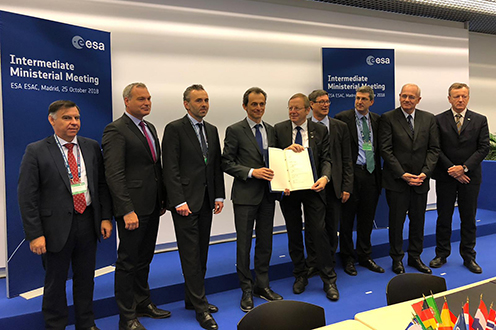Pedro Duque announces that Spanish Earth observation satellite, Ingenio, will be put into orbit in 2019
News - 2018.10.25
He also said that the next Ministerial Meeting of the European Space Agency (ESA), entitled Space19+, will be held in Seville. This means that projects worth more than 12 billion euros will be approved in the Andalusian regional capital, of the more than 45 billion euros that the ESA and EU will allocate to the space sector in the period 2021-2027.
These announcements were made at the Intermediate Ministerial Meeting (IMM18) held earlier today at the European Space Astronomy Centre of the ESA in Villanueva de la Cañada (Madrid). This meeting was attended by the ESA Director General, Johann-Dietrich Wörner, representatives from the ESA Member States and observer countries, and representatives from the European Commission.
In his speech as Chairman of the ESA Council, Pedro Duque confirmed Spain's firm commitment to the space sector and underlined the need to improve coordination mechanisms between the European Union and the ESA in order to position Europe at the cutting edge of space research. He also announced that it was agreed to draw up a Strategic Plan for the European Space Agency. In this regard, he confirmed that Spain, which is already responsible for critical components of the Ariane and Vega rockets, will take on an increasingly more important role in building the next generation of rockets. Two resolutions were also approved at the meeting to enhance relations between the European Union and the European Space Agency, as well as the coordination mechanisms and division of roles between the ESA and the EU in order to comply with the same strategic guidelines.
The Spanish delegation was led by the State Secretary for Universities, Research, Development and Innovation, Ángeles Heras, who was accompanied by the Director-General of the Centre for Technological and Industrial Development (CDTI), Javier Ponce. In her speech, Ángeles Heras, highlighted the transformation taking place in space research due to new emerging players, such as India, China and Brazil, and the economic weight stemming from satellite navigation. With that in mind, the State secretary underlined the need for Europe to adapt to the new scenarios and jostle for position on the international front line.
Furthermore, the State secretary said that the skills, experience and procedures of the European Space Agency (together with the leadership of the European Commission and cooperation from the Member States) should be harnessed to consolidate Europe's role in space leadership. In this regard, the Spanish delegation expressed its support for ESA's role as the agency to oversee development of the next generation of the main EU systems, such as Copernicus and Galileo.
The next meeting, in November 2019, is expected to discuss the agency's strategy for the next decade and allocate budgets for the subsequent four years.
Non official translation





